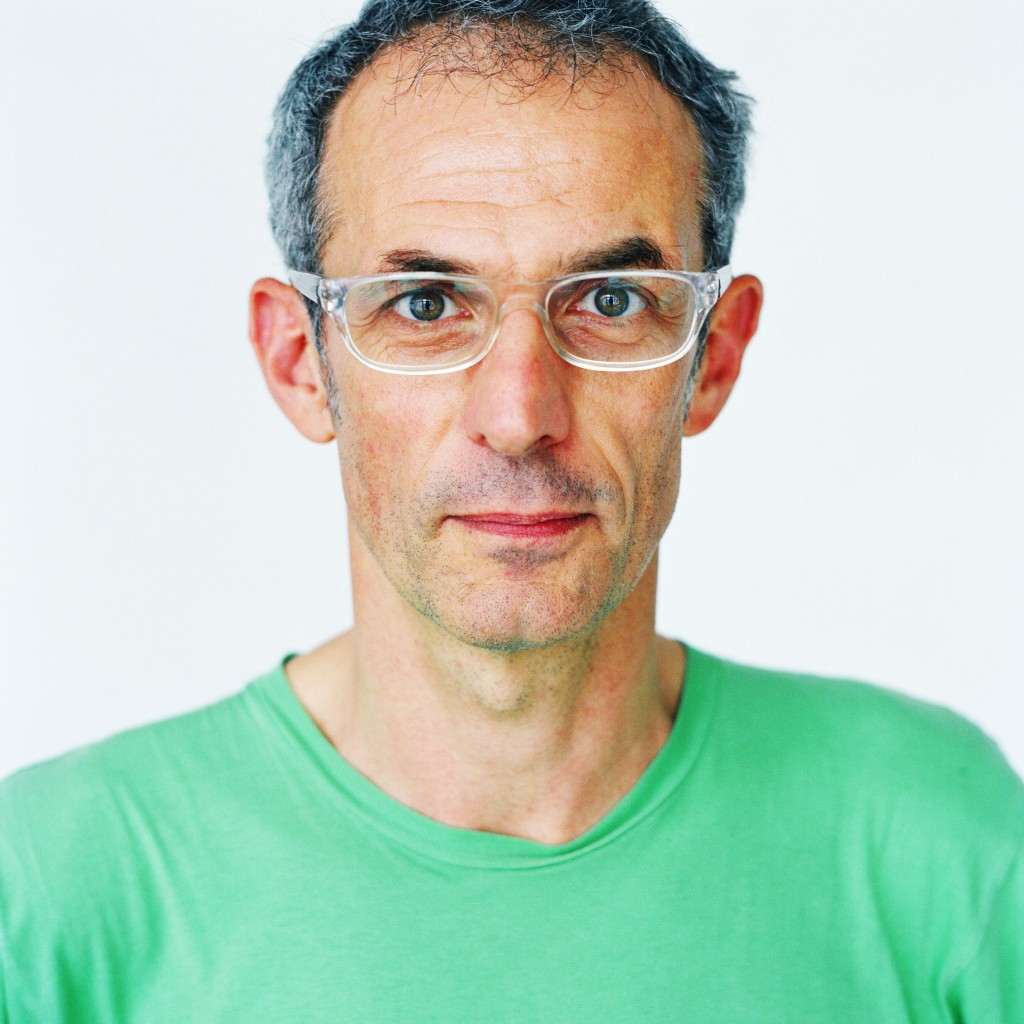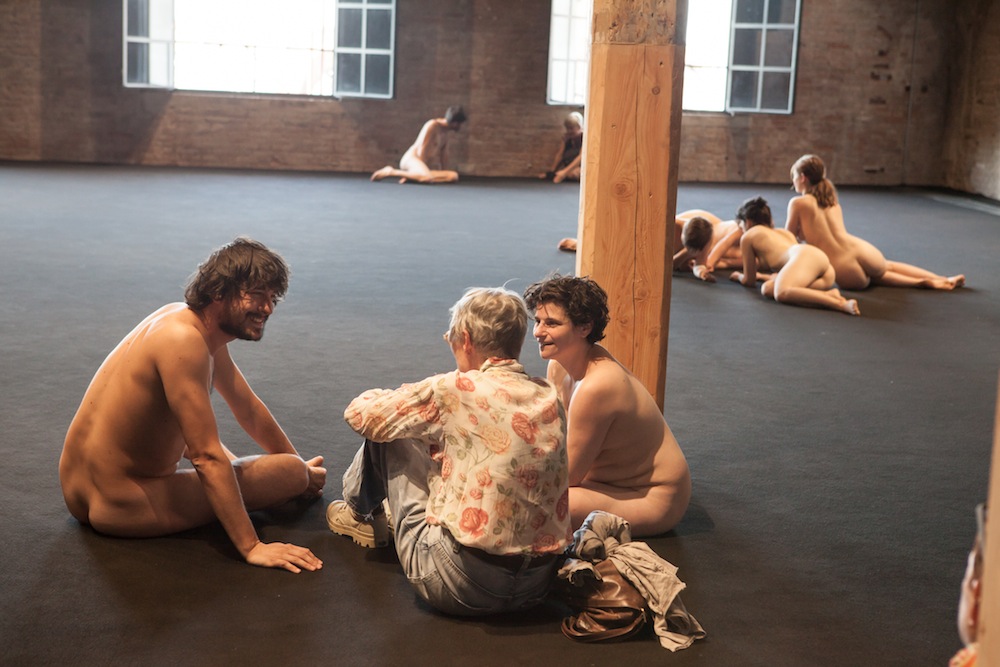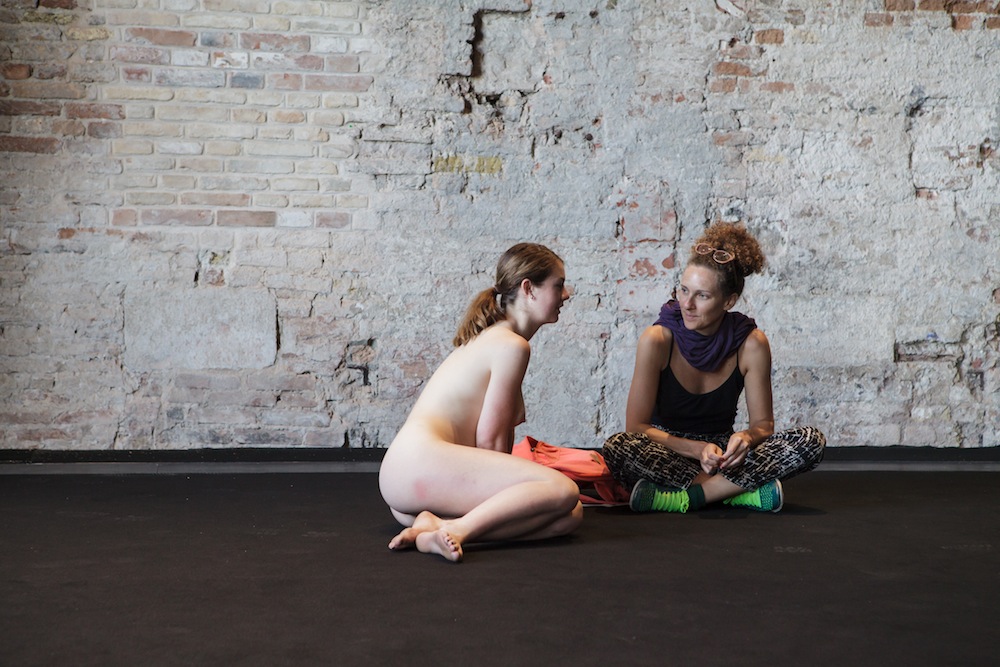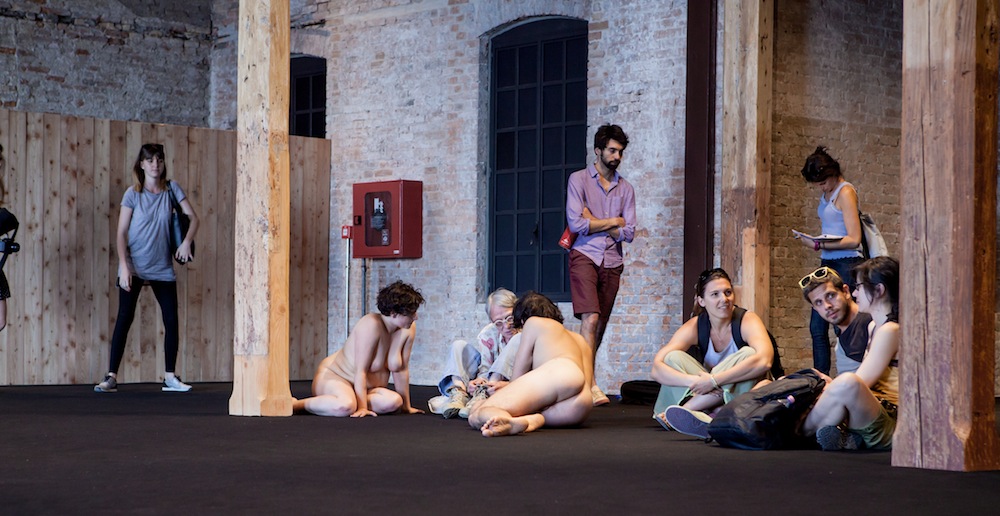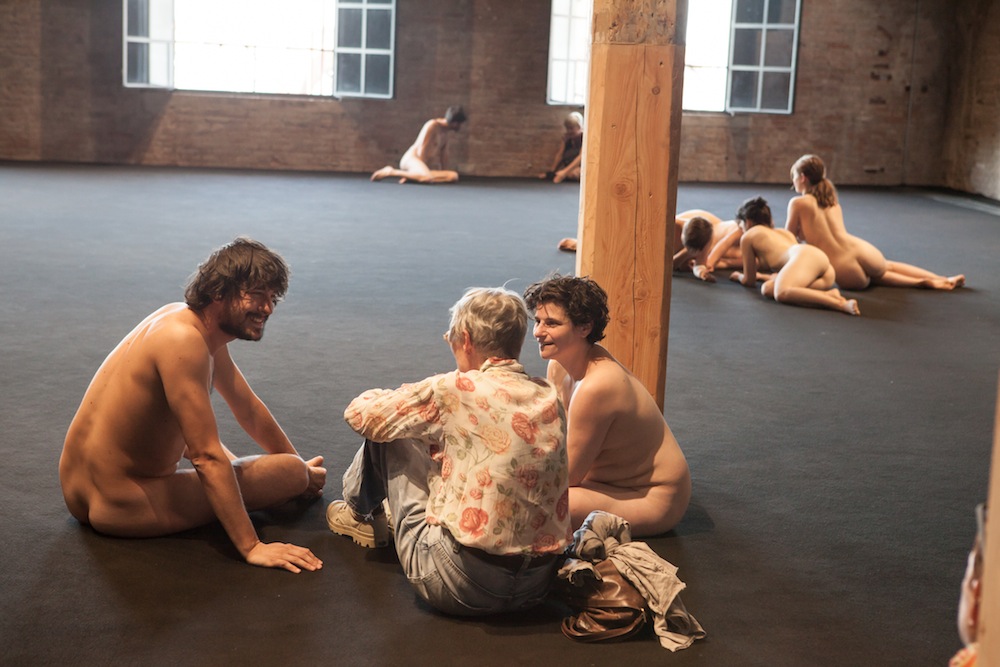A old warehouse of Arsenale (Venice) hosted last week two completely different performances, both acted by 18 dancers applying to a summer school at Dance Biennale Festival.
Both the pieces were working on the acted, unmediated but solicited spoken word.
The first is ultra-white and bright, ultra-simple, ultra horizontal: the performers somehow interact with themselves drawing with their (totally naked) bodies position in the air or on the floor, walking and sitting as they pretend to be four-footed. They reach the visitors so forth and start a conversation – and visitor can come, go, return as they wish all along the 3 hours duration of the exhibition. I’ve been asked what I was feeling when falling in love.
The second is totally dark, with a military disposition of audience and performers, this latter were the same dancers acting in the first one. Lasting only 20 minutes, it is an improvised, blind dialogue about any kind of issue. The light is switched on when it is needed to mark the end of the performance.
The carousel of limbs in the first – Title in Process (2015, with Scarlet Yu) – and the martial linearity of the second – Excerpts of Low Pieces (2009-2011) – in other terms, the ultra-contemporary and the ultra-baroque – are brainchildren of a same man, who in 1991 changed his life, driving it toward dance. Xavier Le Roy.
Your story (biography) with three specific hints: the first about your childhood, the second about your first split from scientific studies to dance and the third about the actual age and on the way you use the dance to speak to worlds so different for their native culture.
This can take two months to reply! I’ve been raised in France, I was born in the suburbs of Paris and lived in South of France since I was two years old. My father was an information technology technician and my mother a kids’ teacher. My village was of 2500 inhabitants; my childhood, given that I’ve born in the Sixties, was placed in the expanding phase of Europe, fully applied on modernity. A very good period until, I guess, the first Oil crisis.
How and why I changed my activity by working in the field of science to dance (he is trained as a molecular biologist)? When I started to do my PHD, I started also my first professional experience in a laboratory and then I met the reality of what is the research in that field – not as I have imagined it (a sort of romantic idea of this profession). I was asked to produce science and not to search, to put it in short: it was all about producing and not about investigating and experiencing. When I started my PHD, it was also when I was ending a love story lasting three years. It was extremely painful, really a drama. That was coinciding with the time I started to take dance classes. There is another factor: I lived in Montpellier where there is a very important dance festival and where I so started my education about choreography. Before dance, I was practicing a lot of sport, my childhood was very much about soccer and basketball, the main – and only! – activities I was interested in. The frustration about the world and about the situation after that love affair made me more and more practicing dance and less and less working in my scientific activity. I finished my PHD because I had to do it, but then I shifted completely. Since then, 1991, I so work in the field of choreography.
Your stage design speaks for anybody, I do not only mean to a Japanese and to an European touching the same chords, but also to who comes from the ‘highest’ culture as well as from the ‘low’. Where do you find the right click in doing so? Where is the magical, how do you find the right pattern, a specific pathway like so?
I have this concern all the time. I want to address the performances in this way. I started dance late and felt myself in a world for initiated, a world where I did not know at all the codes. I tried to learn and I encountered a lot of difficulties, before being able to do that I felt also rejected. The idea to start from a point where I do not know more than you and you do not know more than me, but you know things that I do not know and I do know things that you do not know. That’s the cohesion, that’s how we can share it and try to find a way where you can access the world without imperatively having references. That’s why in the vocabulary I use I rarely use dance movements as bases but rather movements that are either very singular or that everybody can do…
Your idea of ‘dance’ is related to life in the most unpredictable way and you’re the first contemporary choreographer willing and succeeding, in any context, to transform audience in active subjects even because you search the feral in each of us…
Maybe you say so because you see my last two performances in Venice. I use very much the idea of the French philosopher Jack Rancière who says something very dear to me “Equality should not be a goal but the starting point”. That’s what I decided to apply.
Your relation with written word and with spoken word: do you treat them equally or do you have a source you privilege between the two?
I use a lot of situations of conversation in many works and this takes different forms. There is a piece called Product of Circumstances that is in form of a lecture, literally a piece that I wrote and then I read. In Title in Process (2015), when the performers engage a conversation with the visitors, they have three questions they can use and there is no text. These conversations are not scripted. I like the widest range and use written or spoken words according to what is needed for what I want to do.
About your experience as a teaching choreographer, what the young generations are expecting from you and viceversa?
In this latter experience in Venice, what they gave to me is to make this experiment possible: they gave me their curiosity and desire to make and share that experience, it was great, very positive.
Which is the most important achievement you obtained as choreographer and dancer and which is, on the other hand, the one as the more intimate yourself?
Well, I think the best achievement is to be succeeding into shifting from a field to another. To be able to do what you really like to do and want to do and being able to do it and loving it, is a big luck. A privilege. And this achievement can work either for the professional and the intimate level.
What your city, Paris, is giving to you and vice versa?
I have the luck to have a residency, since three years, at the Thèâtre de la Cité Internationale Universitaire which was really helpful and nice. It is almost finishing. In general I do not like Paris.
Can you share your favourite cooking or eating passion of the moment?
I always like a normal pizza! At the moment what I like to eat? Good question …I am not so fixed on one thing, I surely, in general like Asian food…the last experience was very nice…I do not know (he smiles)!
Which has been the place in this world where you successfully lived “slow”, if this ever happened?
I would like to learn a little bit more to live slow. It means to say no to proposals. It’s difficult because it is a sort of a cycle, there is a lot of pressure sometime and somehow; if you start to say no maybe there is not anymore the question and you do not get anymore proposals.
It is funny, as a cycle, sometimes there are weeks in which I would say no to a series of proposals – projects, an essay, a text, interviews – but when this phase happens it is difficult to see it because you’re already in the stream with lots of things to do….
I live slow when I do works in form of exhibition, that allows to stay in the same place for a while and have a rhythm that can be slow.
Music and some books with you now?
Music in my life changes a lot. At the moment, I listen Bach’s Sonatas and partitas transposed for luth. I’m reading a book by François Jullien about landscape.
Which is a talent you have and the one you miss?
I think I do not have talents. I think I would like to have rhythm, and to play music.
What have you learnt from life until now?
Life is great.
Cover: Xavier Le Roy, 2011 (courtesy picture: Emma Picq)
The calendar of the next performances:
http://www.xavierleroy.com/page.php?id=9207d8721c7f1d3c866bc1548732990f405bc66a&lg=en
